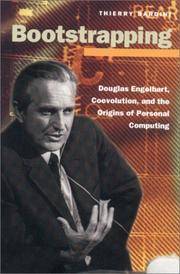
Bootstrapping : Douglas Engelbart, Coevolution, and the Origins of Personal Computing Paperback - 2000 - 1st Edition
by Bardini, Thierry
- Used
Description
Details
- Title Bootstrapping : Douglas Engelbart, Coevolution, and the Origins of Personal Computing
- Author Bardini, Thierry
- Binding Paperback
- Edition number 1st
- Edition 1
- Condition Used - Good
- Pages 312
- Volumes 1
- Language ENG
- Publisher Stanford University Press, Chicago
- Date 2000-12-01
- Illustrated Yes
- Features Illustrated, Index, Table of Contents
- Bookseller's Inventory # 9209634-6
- ISBN 9780804738712 / 0804738718
- Weight 0.99 lbs (0.45 kg)
- Dimensions 9.2 x 6.14 x 0.84 in (23.37 x 15.60 x 2.13 cm)
-
Themes
- Chronological Period: 1960's
- Chronological Period: 1970's
- Library of Congress subjects Human-computer interaction, User interfaces (Computer systems)
- Library of Congress Catalog Number 00056360
- Dewey Decimal Code 004.160
About Better World Books Nevada, United States
Not everyone has access to a book the way you do, which is why Better World Books cares. We have donated millions of books and raised millions of dollars to support literacy, libraries and education. Every Better World Books purchase you make contributes. Oh yeah, great prices, fast delivery, unique titles and a generous return policy - we’ve got that too. Thank you for shopping with us!
Better World Books wants every single one of its customers to be happy with their purchase. If you are not satisfied your purchase or simply find out that it was not the book you were looking for, please e-mail us at: help@betterworldbooks.com. We will get back to you as soon as possible with directions on how to return the book to our warehouse. Please keep in mind that because we deal mostly in used books, any extra components, such as CDs or access codes, are usually not included. CDs: If the book does include a CD, it will be noted in the book's description ("With CD!"). Otherwise, there is no CD included, even if the term is used in the book's title. Access Codes: Unless the book is described as "New," please assume that the book does *not* have an access code.
From the rear cover
Engelbart felt that the complexity of many of the world's problems was becoming overwhelming, and the time for solving these problems was becoming shorter and shorter. What was needed, he determined, was a system that would augment human intelligence, co-transforming or co-evolving both humans and the machines they use. He sought a systematic way to think and organize this coevolution in an effort to discover a path on which a radical technological improvement could lead to a radical improvement in how to make people work effectively. What was involved in Engelbart's project was not just the invention of a computerized system that would enable humans, acting together, to manage complexity, but the invention of a new kind of human, "the user." What he ultimately envisioned was a "bootstrapping" process by which those who actually invented the hardware and software of this new system would simultaneously reinvent the human in a new form.
The book also offers a careful narrative of the collapse of Engelbart's laboratory at Stanford Research Institute, and the further translation of Engelbart's vision. It shows that Engelbart's ultimate goal of coevolution came to be translated in terms of technological progress and human adaptation to supposedly user-friendly technologies. At a time of the massive diffusion of the World Wide Web, Bootstrapping recalls the early experiments and original ideals that led to today's "information revolution."
Media reviews
Citations
- Choice, 06/01/2001, Page 1825
- Scitech Book News, 06/01/2001, Page 25

